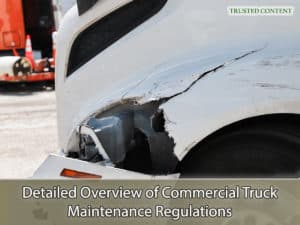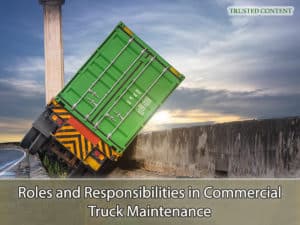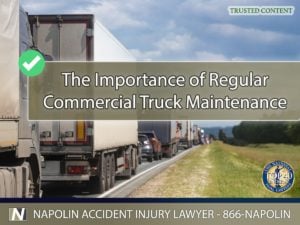The Importance of Regular Commercial Truck Maintenance
In California, the bustling highways are often dominated by commercial trucks, integral to the state's economy and supply chain. The safety and efficiency of these vehicles hinge on rigorous maintenance practices. This article explores the intricate legal framework governing commercial truck maintenance in California, emphasizing the critical role of these regulations in safeguarding public safety and the responsibilities of trucking companies and drivers.

Detailed Overview of Commercial Truck Maintenance Regulations
Detailed Overview of Commercial Truck Maintenance Regulations
Commercial trucks in California are governed by a complex set of federal and state regulations. The Federal Motor Carrier Safety Administration (FMCSA) sets nationwide standards, while specific California laws are outlined in the California Vehicle Code (CVC). These regulations mandate regular inspections, maintenance schedules, and compliance checks to ensure that every commercial vehicle on the road meets safety standards. For instance, under CVC Section 34501.12, commercial vehicles must undergo annual inspections by a qualified inspector.
Pre-Trip and Post-Trip Inspections: A Critical Routine
A key aspect of maintaining commercial trucks is the mandatory pre-trip and post-trip inspections conducted by drivers. These inspections, as detailed in FMCSA Regulation 396.13, require drivers to examine critical components like brakes, tires, lights, and steering mechanisms. Any defects found must be reported and addressed before the vehicle can be operated. This routine not only ensures vehicle safety but also significantly reduces the risk of on-road failures.
California's Specific Maintenance Requirements for Commercial Trucks
In California, commercial truck maintenance is stringently regulated to ensure road safety. The state mandates specific requirements such as brake inspections, adherence to weight limits, and emission control checks. For example, according to CVC Section 34501.5, commercial vehicles must comply with strict emission standards, reflecting California's commitment to environmental protection. These state-specific regulations are enforced through regular inspections at designated checkpoints and weigh stations.
The Direct Impact of Maintenance on Road Safety
The correlation between regular maintenance of commercial trucks and road safety is undeniable. Properly maintained vehicles are less likely to be involved in accidents caused by mechanical failures. The California Highway Patrol's Commercial Vehicle Section actively enforces maintenance standards, recognizing that well-maintained trucks are crucial for preventing accidents that can lead to severe injuries or fatalities. This proactive approach to maintenance is not just about complying with laws; it's about creating a safer driving environment for everyone on the road.
Legal Consequences of Neglecting Truck Maintenance
Ignoring maintenance requirements can have severe legal implications for trucking companies and drivers in California. Under the FMCSA regulations and CVC, failure to maintain commercial trucks can lead to hefty fines, legal liabilities, and in extreme cases, suspension of operating licenses. For instance, non-compliance with brake standards can result in penalties under CVC Section 26453. Moreover, in the event of an accident caused by poor maintenance, the responsible parties could face lawsuits and damage claims, emphasizing the importance of adhering to maintenance protocols.

Roles and Responsibilities in Commercial Truck Maintenance
Roles and Responsibilities in Commercial Truck Maintenance
The responsibility for maintaining commercial trucks in California is shared between trucking companies and drivers. Companies are required to implement regular maintenance schedules and ensure compliance with all relevant regulations. Drivers, on the other hand, are tasked with conducting daily inspections and reporting any issues. This collaborative effort is crucial in maintaining the high safety standards expected on California roads.
Extended Benefits of Regular Maintenance
Beyond compliance and safety, regular maintenance of commercial trucks has several additional benefits. It extends the lifespan of the vehicles, improves fuel efficiency, and reduces overall operational costs. Additionally, well-maintained trucks contribute to environmental conservation by minimizing emissions. For drivers, operating a well-maintained vehicle enhances job satisfaction and reduces the stress associated with potential breakdowns and accidents.

The Importance of Regular Commercial Truck Maintenance
The Importance of Regular Commercial Truck Maintenance
Regular maintenance of commercial trucks is not just a regulatory requirement in California; it's a fundamental aspect of road safety and operational efficiency. If you or someone you know has been affected by a commercial truck-related incident, Napolin Accident Injury Lawyer is here to assist. Contact us at (866)-NAPOLIN for a free consultation. Our extensive experience in handling cases related to commercial truck maintenance and accidents ensures that your rights are protected, and justice is served.
- Safely and Legally Navigating Parking Lots in California - July 15, 2024
- Navigating the Aftermath of a Highway Auto Accident in California - July 15, 2024
- An Overview of California's Commercial Truck Insurance Laws - July 15, 2024
